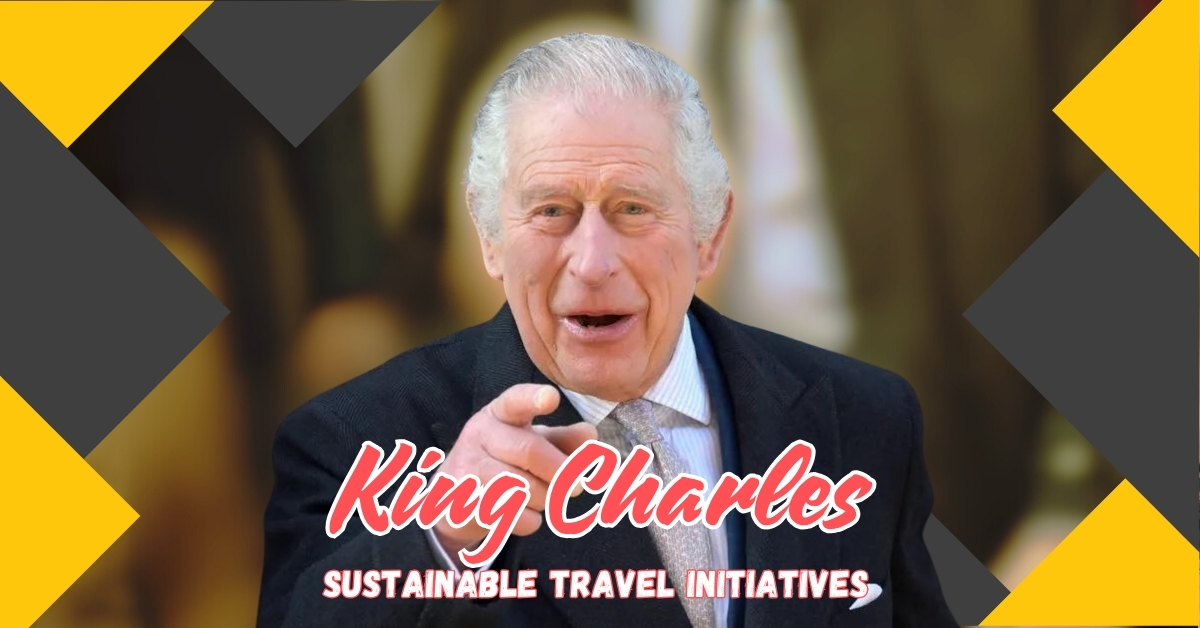In recent years, the importance of sustainable travel has gained significant attention as climate change and environmental degradation continue to pose serious challenges to the planet. One prominent figure who has been actively advocating for sustainability in travel is King Charles. His efforts in promoting eco-friendly travel practices are not just limited to his own choices, but they also extend to influencing global travel norms and setting an example for the tourism industry. In this guide, we’ll explore King Charles sustainable travel initiatives, his environmental vision, and why these efforts are crucial for the future of green tourism.
1. What Are King Charles’ Sustainable Travel Initiatives? An Overview of His Environmental Vision
King Charles has long been known for his dedication to environmental conservation and sustainable practices. His sustainable travel initiatives are an extension of his broader environmental vision, which includes promoting biodiversity, reducing carbon footprints, and supporting green tourism. The core goal of these initiatives is to minimize the environmental impact of travel and encourage responsible tourism practices.
Key Elements of His Sustainable Travel Initiatives
- Promoting Low-Carbon Transportation
King Charles advocates for low-carbon modes of transportation, such as electric cars, hybrid vehicles, and even biofuel-powered jets. He has been a strong proponent of the adoption of cleaner technologies to reduce the carbon emissions associated with travel. - Supporting Sustainable Tourism Projects
Through various foundations and partnerships, King Charles has supported initiatives aimed at promoting eco-tourism and sustainable travel infrastructure. These projects focus on protecting natural habitats, enhancing the sustainability of tourist destinations, and promoting community-based tourism. - Raising Awareness About the Environmental Impact of Travel
King Charles actively raises awareness about the environmental consequences of traditional travel practices. He emphasizes the need for individuals, governments, and organizations to make informed choices that prioritize the health of the planet.
2. The History of King Charles’ Environmental Advocacy: A Lifelong Commitment to Sustainability
King Charles’ dedication to environmental causes is not a recent development; it is a commitment that dates back several decades. He has been vocal about climate change, sustainability, and conservation since the 1970s, long before these topics became mainstream.
A Timeline of King Charles’ Environmental Advocacy:
- 1970s: King Charles began speaking publicly about the need to address pollution and the threats to natural ecosystems.
- 1980s: He launched several initiatives focused on organic farming and sustainable agriculture.
- 1990s: King Charles established the Prince’s Trust, which supports environmental education and sustainability projects.
- 2000s: He became an advocate for sustainable urban planning and renewable energy solutions.
- 2010s and Beyond: King Charles started focusing more on sustainable travel, using his influence to promote green tourism practices.
His early commitment to these causes has positioned him as a thought leader in the sustainability movement, making his sustainable travel initiatives a natural extension of his lifelong advocacy.
3. Top 5 Sustainable Travel Projects Led by King Charles: Making a Global Impact
King Charles’ sustainable travel initiatives include a variety of projects aimed at reducing the environmental impact of tourism and promoting eco-friendly travel options. Here are five of his most impactful sustainable travel projects:
1. The Sustainable Markets Initiative
Launched in 2020, the Sustainable Markets Initiative aims to accelerate the transition to sustainable markets and eco-friendly business practices across industries, including travel and tourism. The initiative encourages the adoption of green technologies and sustainable supply chains, which are crucial for the travel industry’s shift towards sustainability.
2. The Prince’s Foundation for Building Community
This foundation works on creating sustainable and environmentally friendly communities. It promotes low-impact tourism by designing eco-friendly tourism facilities and encouraging the use of local materials and traditional construction methods.
3. Highgrove House as a Model for Sustainable Tourism
King Charles’ private residence, Highgrove House, serves as a model for sustainable tourism. The estate is managed using organic farming principles, renewable energy, and eco-friendly practices, making it a prime example of how historic sites can be managed sustainably.
4. Travel By Sustainable Transport
Whenever possible, King Charles chooses eco-friendly modes of travel, such as taking the train instead of flying or using electric vehicles. His preference for sustainable travel options is a public demonstration of his commitment to reducing the environmental impact of royal travel.
5. The Harmony Project
The Harmony Project is a global initiative inspired by King Charles’ book Harmony: A New Way of Looking at Our World. It promotes sustainable travel and living practices that align with natural principles. The project encourages travel destinations to adopt practices that protect the environment, enhance biodiversity, and promote cultural heritage.
4. How King Charles Promotes Green Travel for the Royal Family and Beyond
King Charles has made significant strides in promoting sustainable travel not only for himself but also for the entire royal family. His influence extends to setting new travel protocols and encouraging the use of eco-friendly practices.
Green Travel Protocols for the Royal Family
King Charles has implemented green travel protocols that prioritize the use of sustainable transportation and accommodations. Some of these practices include:
- Using Electric and Hybrid Vehicles: The royal family has adopted the use of electric and hybrid vehicles for local travel.
- Offsetting Carbon Emissions: King Charles ensures that the carbon emissions from necessary air travel are offset through investments in reforestation and other environmental projects.
- Eco-Friendly Accommodations: Whenever possible, the royal family stays in eco-friendly hotels and lodges that follow sustainable practices.
Advocating for Change in the Tourism Industry
King Charles uses his platform to advocate for broader changes in the tourism industry. He collaborates with travel organizations, governments, and businesses to promote sustainable travel policies that can be adopted globally.
5. Impact of King Charles’ Sustainable Travel Efforts: Real-World Outcomes
The impact of King Charles’ sustainable travel initiatives is not just theoretical; it has led to tangible benefits for the environment and the travel industry.
1. Reduction in Carbon Footprint
King Charles’ efforts to promote low-carbon travel options have contributed to a reduction in the carbon footprint of royal travel. By using biofuels, electric vehicles, and carbon offset programs, he sets an example for others to follow.
2. Support for Green Tourism Projects
Through his foundations, King Charles has funded numerous green tourism projects that promote conservation and sustainable community development. These projects have protected natural habitats, supported local economies, and created sustainable livelihoods for communities involved in eco-tourism.
3. Influencing Public Perception
King Charles’ high-profile support for sustainable travel has helped raise awareness and shift public perceptions. His advocacy has encouraged more people to consider the environmental impact of their own travel choices.
6. Challenges and Criticisms: Addressing the Controversies of Royal Travel
Despite his efforts, King Charles has faced some criticism regarding the sustainability of royal travel. Critics point out that the royal family’s travel needs often involve flying, which has a significant environmental impact.
Common Criticisms:
- Use of Private Jets: The use of private jets has been a point of contention, as it contradicts the message of sustainability.
- High Carbon Footprint of Royal Tours: Royal tours often involve extensive travel, which increases the carbon footprint.
- Balancing Tradition with Modern Sustainability: The royal family’s traditional role often requires public appearances around the world, making it difficult to balance with sustainable travel practices.
King Charles’ Response
To address these concerns, King Charles has committed to offsetting the carbon emissions from necessary travel and has advocated for using more sustainable options whenever possible.
7. What’s Next for King Charles’ Sustainable Travel Agenda? Future Goals and Projects
Looking ahead, King Charles has several goals for promoting sustainable travel. Some of his future plans include:
- Expanding the Sustainable Markets Initiative to include more travel and tourism partners.
- Developing New Partnerships with airlines and travel companies to promote green travel technologies.
- Encouraging the Use of Sustainable Aviation Fuel (SAF) for royal flights and advocating for broader adoption across the aviation industry.
These initiatives aim to make sustainable travel more accessible and widespread, setting a new standard for eco-friendly tourism.
8. How You Can Support Sustainable Travel: Lessons from King Charles
Inspired by King Charles’ efforts? Here are some practical tips to incorporate sustainable travel into your own life:
1. Choose Eco-Friendly Transportation
Opt for trains, buses, or electric vehicles over flying whenever possible.
2. Offset Your Carbon Footprint
Use carbon offset programs to compensate for the emissions from your travel.
3. Stay in Eco-Friendly Accommodations
Look for hotels and lodges that follow sustainable practices, such as using renewable energy and minimizing water usage.
4. Support Local Communities
Choose destinations that promote community-based tourism and contribute to the local economy.
5. Travel Light
Pack lightly to reduce the weight carried by planes or cars, which helps lower fuel consumption.
For more exciting blogs, visit our homepage Magzineco.
9. FAQs: Common Questions About King Charles’ Sustainable Travel Initiatives Answered
1. What are King Charles’ sustainable travel initiatives?
King Charles’ sustainable travel initiatives include promoting low-carbon transportation, supporting eco-tourism, and raising awareness about the environmental impact of travel.
2. How does King Charles promote green travel?
He promotes green travel by using sustainable transportation, supporting conservation projects, and encouraging eco-friendly practices in the tourism industry.
3. What is the Sustainable Markets Initiative?
The Sustainable Markets Initiative, launched by King Charles, aims to accelerate the adoption of sustainable business practices, including in the travel and tourism sectors.
4. What impact have King Charles’ initiatives had?
His initiatives have contributed to a reduction in the carbon footprint of royal travel and supported numerous sustainable tourism projects worldwide.
5. Does King Charles use private jets?
While the use of private jets is sometimes necessary for security and scheduling reasons, King Charles offsets the emissions and advocates for the use of sustainable aviation fuel.
6. How can I support sustainable travel?
You can support sustainable travel by choosing eco-friendly transportation, offsetting your carbon emissions, and supporting green tourism initiatives.
7. What are some of King Charles’ future goals?
Future goals include expanding the Sustainable Markets Initiative and advocating for the use of sustainable aviation fuels.
8. What is eco-tourism?
Eco-tourism focuses on responsible travel to natural areas that conserves the environment and supports local communities.
9. How has King Charles influenced sustainable travel?
He has used his influence to promote sustainable travel policies, support green tourism projects, and raise awareness about the environmental impact of travel.
10. Why is sustainable travel important?
Sustainable travel minimizes environmental impact, supports local economies, and preserves natural resources for future generations.
Conclusion: King Charles’ Lasting Impact on Sustainable Travel
King Charles’ commitment to sustainable travel initiatives sets a powerful example for individuals and organizations worldwide. By promoting low-carbon transportation, supporting eco-tourism, and advocating for global change, he has made a significant contribution to the movement toward eco-friendly travel. As his efforts continue to grow, King Charles’ leadership in sustainable travel will undoubtedly inspire more people to adopt responsible and environmentally conscious travel practices, paving the way for a greener future.




